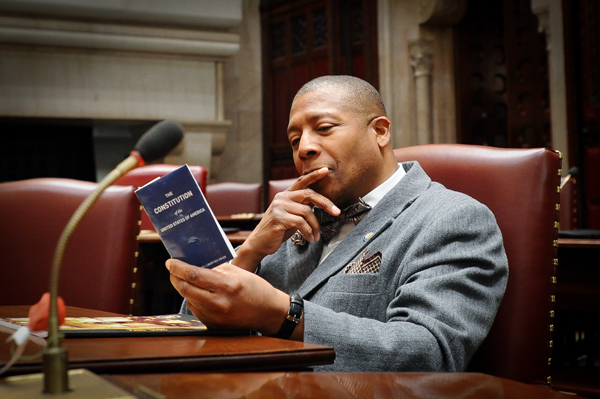BY STATE SENATOR JAMES SANDERS, JR.
On his long running television show, “The Apprentice,” then-businessman Donald Trump was known for saying “You’re Fired.” The catchphrase always seemed to pack the right amount of surprise and sting, but on May 9 when the White House announced the firing of FBI Director James Comey, it came with the strong air of suspicion and mistrust.
Most legal experts agree that the act itself was lawful: the President is the last word in all executive branch personnel decisions. What startled many was that it came during an FBI investigation into the Trump campaign’s ties to Russia. If it comes to light that Trump intended to impede an ongoing investigation, that would be obstruction of justice – the crime for which a Republican Congress impeached Bill Clinton.
And it seems likely that obstruction was exactly his aim.
The White House, at first, claimed that it was the Justice Department that recommended the firing, based on Comey’s mishandling of the Hillary Clinton email investigation. However, Trump’s public letter to Comey actually mentioned the Russia investigation, claiming that Comey had told Trump “three times” that Trump “was not under investigation.” What’s more, in a TV interview the day after the firing Trump did an about face, saying that he himself had ordered the firing, and suggesting he had been displeased with Comey’s investigation of the Russia connection.
On top of all that, consider the fact that Trump was tweeting his displeasure about the Russia investigation on the day before the Comey termination. Moreover, sources say Trump was angry that Comey would not support his loopy claims that Obama had wiretapped him. Finally, reports have emerged that Trump tried to extract oaths of loyalty from Comey, and that he even asked Comey to cease investigating former National Security Adviser Michael Flynn, who resigned on February 13, 2017, amidst claims he had been in contact with Russia during the election.
In the end, it is obvious that Trump’s feelings about Comey are tainted by a desire to halt unfriendly investigations. Trump claims he had been considering firing Comey from day one, and while that may be true, Trump has tried to put himself above the law by stopping an investigation.
If that’s the case, can Trump be charged with a crime or impeached? Legal scholars are split on whether or not a President can be charged by a prosecutor. A president can be impeached by Congress. Richard Nixon resigned when a bipartisan group of lawmakers threatened to impeach him for obstruction of justice, not because anyone proved that he ordered the Watergate break in – that was never proven – but because he had tried to thwart the FBI’s investigation into it. Likewise, though Trump has clearly thwarted an ongoing investigation, it would take a group of Republicans coming forward to begin impeachment proceedings against him. That is, unfortunately for us and our democracy, unlikely.






























